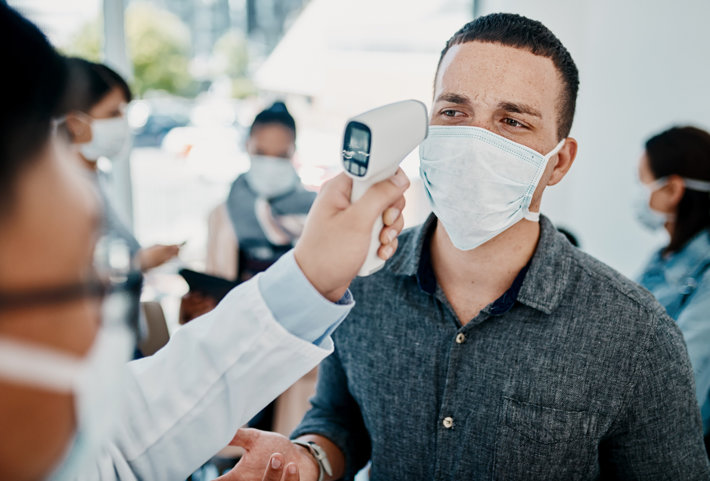Challenges that Addicts Face Seeking Treatment During COVID-19
According to a 2016 Surgeon General report, there is a massive treatment gap in this country, with only about one in ten addicts ever receiving help for their addiction problems. And given the additional risks that addicts face in light of the coronavirus pandemic, getting access to treatment is likely to be even more challenging for addicts.
Challenges Addicts Face Finding
Help During COVID-19

Getting off of drugs and alcohol is no easy task. An addict will almost always face obstacles in overcoming addiction. Sometimes, addicts do not initially want to seek treatment and must be helped to see just how critical it is that they do get help. Add to these already trying circumstances the coronavirus pandemic currently raging across America, and conditions for addicts are even more dire than before. Let’s take a look at some of the obstacles addicts might face.
- Difficulty traveling during a time when traveling can be seen as dangerous. Given the ongoing, developing nature of the COVID-19 pandemic, many states have implemented statewide and even region-wide travel restrictions to curb the spread of COVID-19. The problem for addicts, though, is that inhibiting travel is essentially the same as inhibiting treatment. However, traveling outside of one’s hometown for rehab is often recommended, since being in a new and different environment can be of great benefit to the recovery process.
- Being concerned about catching COVID while at rehab. Because people are more susceptible to catching COVID-19 when they are around lots of people for extended periods (recall COVID outbreaks at nursing and assisted living homes), some addicts may be concerned that going to a rehab center will increase their risk for contracting COVID. However, if the treatment center has the proper protocols and procedures in place to guard against the incursion of coronavirus, a long-term rehab center may just be the safest place for an addict to be during these times.
- Concern about whether or not a rehab center is following safety protocols. And, too, an addict may be concerned that a rehab center is not following safety protocols, and will not be able to provide a safe, COVID-free environment for them to get off of drugs and alcohol. If you are looking for treatment, ask the treatment center for information on their policies and procedures regarding COVID and other illnesses.
- Financial distress. Given that the COVID-19 pandemic brought with it what might be the worst unemployment crisis in American history, addicts may be faced with harder economic times than usual. Lack of access to funding can make seeking treatment more difficult, and many addicts may see a problematic financial condition as a reason not to seek treatment.
- Wanting to stay at home. The safety and health concern over COVID-19 is legitimate, increasing fear and stress among many Americans. This is an unprecedented health crisis that is continuously reported on and regularly discussed. The result has been a concern to the point where many Americans, addicts included, do not even want to leave their homes.
- More wary and fearful of getting out and making positive changes in their life due to fear of COVID. For some addicts, it takes a monumental effort for them to bring themselves to seek help for their addiction. Their addiction has become such a massive part of who they are that getting rid of the addiction seems impossible. Add in the fear and worry brought on by COVID, and many addicts may want to stay at home and maintain their status quo.
- Lack of public help or support (as most public healthcare services are focused on COVID). Up until COVID-19, addicts could rely on public healthcare services such as support groups, medical attention, free screening, and other services for help for their addiction. With the onset of the coronavirus pandemic, though, many of these services have been temporarily canceled so that the medical community can focus on the epidemic.
Like the addicts themselves, the family members of addicts face unique challenges in helping their loved ones get off drugs and alcohol during the COVID-19 public health crisis. Despite these difficulties and challenges, the family members of addicts must do everything they can to get their loved ones into treatment.
Addiction Treatment—The Key to
Resolving an Addiction Crisis
While no one can effect positive change in an addict’s life but the addict himself, the family members and loved ones of addicts should take it upon themselves to make it as manageable as possible for the addict to get into and through treatment. That means understanding and being willing to contend with the additional challenges that COVID-19 places on addicts and their general willingness or ability to seek treatment.
Just referring back to some of the points mentioned above, if an addict is concerned about traveling during COVID, his family should help him organize and schedule a safe transport from his home to a treatment center. If an addict is worried about exposing himself to COVID while in treatment, the family should thoroughly vet the treatment center and ensure the center is following CDC recommendations to prevent the spread of COVID. If the addict is worried about the financial demands of seeking treatment, the family should look for solutions, e.g., a center that accepts health insurance, a third party willing to fund treatment, financing options, etc.
No matter the objection or the concern (even if it is legitimate), voiced by the addict, one must always realize that helping the addict get off of drugs is undeniably more critical. If you know someone struggling with addiction, please reach out to Narconon today to take the first step towards a safe and effective recovery process. Please don’t wait until it is too late or until COVID-19 passes. Get help today.
Sources:
- https://www.niaaa.nih.gov/news-events/news-noteworthy/surgeon-general-issues-landmark-report-alcohol-drugs-and-health
- https://www.ncbi.nlm.nih.gov/pmc/articles/PMC7282772/
- https://www.drugabuse.gov/about-nida/noras-blog/2020/04/covid-19-potential-implications-individuals-substance-use-disorders
- https://theconversation.com/people-with-substance-use-disorders-face-greater-challenges-during-the-covid-19-pandemic-137476
Reviewed by Claire Pinelli, ICAADC, CCS, LADC, RAS, MCAP


